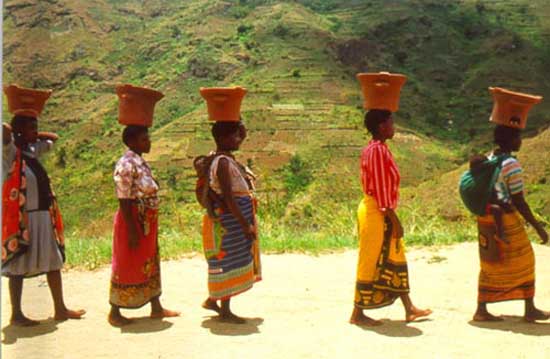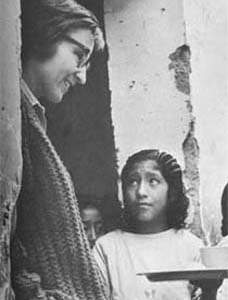
Liberia RPCV Randy Mager is a partner with Phil Giovannini in Blue Moon Safaris helping others see the real Africa, often for the first time taking fewer than 100 clients to Tanzania, their country of choice; they get to know their clients and travel alongside them; and they insist on going about their business in a way that's respectful of the people who call the East African country home
For the love of Africa
By Cory Golden/Enterprise staff writer
Africa is an idea.
For so many Americans, Africa exists as a mix of National Geographic specials full of wildness captured in slow motion, a curved shape of patchwork colors on maps and brief cable news bits with hard-to-chew words like apartheid and genocide.
Phil Giovannini and Randy Mager, two buddies who met while in graduate school at UC Davis, spend a portion of their lives helping others see the real Africa, often for the first time, through their company, Blue Moon Safaris.
The pair aspires to something different in a safari company:
They've stayed small, taking fewer than 100 clients to Tanzania, their country of choice; they get to know their clients and travel alongside them; and they insist on going about their business in a way that's respectful of the people who call the East African country home.
They do so, in part, because Tanzania has come to represent something important to both of them -- a sense of possibility, where the only limits are self-imposed.
"To be in a position in this unclaimed space all around you, it just gives you this feeling of freedom and openness and wildness," Giovannini says.
"It's a place of so much opportunity. In this country, to do something, it's a million-dollar investment to open a hamburger stand. There, it gets down to people and the most basic things in life."
------
Recalls Giovannini: "When I first went to Africa, people -- my friends, my family -- would ask me, 'What's it like?' I would tell them, 'It's like being under water.' "
------
Both Giovannini, 50, and Mager, 49, work for the California Department of Water Resources. They met as in 1986 while studying as UCD graduate students working on their master's degrees in international agricultural development.
Both were "fish heads" interested in aquaculture. Both enjoyed music, having a beer, looking at girls.
They had more in common too: Africa, travel and the experience of seeing the U.S. from the outside.
Giovannini grew up in a military family, living in North Africa, Turkey, Japan and in Europe.
A Bay Area native, Mager's family lived in France when he was young, and he also traveled extensively -- including, at age 12, a memorable two months in South Africa. Later, Mager served in the Peace Corps in Liberia.
After he completed his doctorate in ecology, he settled down in Davis and went to work for the state. He married his wife Lisa, a freelance writer, in 1994, and went from Deadhead to youth soccer referee while raising sons Gabriel, 9, and Aidan, 6.
Giovannini, who completed a doctorate in agricultural and biological engineering, returned to the road.
He worked in Egypt, Hawaii and Costa Rica before moving to Tanzania in 1997 to teach students from Harvard, Stanford and elsewhere as part of a semester-long wildlife and culture program.
Tanzania, a poor country, loomed over by Mt. Kilimanjaro and famous for one of the richest arrays of wildlife anywhere on the planet, quickly provided him with a wealth of experiences -- and stories:
There was the time two lions mated next to his Land Rover on the Serengeti Plain then settled down to snooze, or when locals offered chickens or goats as gifts, or the chance to hunt with poison arrows alongside bushmen.
In 1998, he started a fledgling safari business, mostly arranging for family and friends of former students to come to Tanzania.
At about that time a friend introduced Giovannini to a pretty Tanzanian woman named Seba. She was supposed to help him brush up on his Swahili.
"She never did," Giovannini says. "She was either a terrible teacher or I was a terrible student."
No matter: Giovannini's Swahili improved just the same -- and the couple was married in 1999. Phil and Seba, who is studying English, math and nursing have two children, Massimo, 5, and Miana, 1.
After years living out of a suitcase or a backpack, his possessions in storage and his mail sent to his father's address, Giovannini decided to put down roots in Sacramento, where, in addition to his job with the state, he has taught wildlife management at Sacramento State.
It was after bailing out of a smoky concert with his friend early one night that Giovannini suggested Mager join him in the safari business.
Mager jumped at the proposition:
"It's about time," he joked, "that I quit living through you vicariously."
------
"When you're underwater snorkeling you're in this amazing environment with this beautiful reef and interesting fishes; but you know that where you belong is 20 feet above," Giovannini says. "Africa was like that for me, I felt like I was holding my breath.
"But every time that I went back, I felt less that way."
------
Giovannini and Mager have tried to create a safari company that puts their clients in spots where they can explore their own interests -- be it birds, culture, animals, flowers -- and often do it on their own.
This year the pair have six more safaris planned this year, including a 13-day trip designed for families and a 10-day Mt. Kilimanjaro bicycling trip.
Blue Moon's clients, who've found the company through word-of-mouth or online, at bluemoonsafaris.com, may stay in comfortable lodges or camp in tents, depending on the trip (prices range from $100 to $300 per day).
Real suffering, the company's owners joke, is losing a corkscrew while on safari and being unable to open wine bottles, which come in handy for chatting up university researchers and wildlife photographers over campfires.
After the lengthy plane ride, Blue Moon plans a day for clients to relax, adjust to the 11-hour time difference and take the time to learn a bit of Swahili, the do's and don't of camp and some tidbits about local culture.
They warn their clients that, after three days or so, brushing their teeth with bottled water will lose its charm, but to hang in there.
Clients usually want to see the predators, maybe even a kill. Lions and elephants are easy enough to see, Mager says, solitary leopards and cheetahs less so.
Giovannini and Mager defer to their hired crews of locals as guides. They work on safaris week after week, year after year, and have the skill to know, at 35 mph, on a bumpy road, that a black dot in the distance is a rino.
What the pair doesn't want is to be tour guides waving red flags for people to follow. Instead, Mager and Giovannini plan an itinerary that leaves room for serendipity -- throwing a Frisbee with local children or going birding with a knowledgeable ranger.
Rather than plan 30-minute stops in a Maasai village, they're more likely to set up camp near one and let clients and locals get to know each other. Rather than a quick show of local dancing, clients are more likely to watch local boys bring in the cows at dusk.
"It's just regular folks, hanging," Mager says.
Giovannini explains their philosophy this way: "If you went to Paris and had a luxury week or two, you'd still be able to meet average Parisians. But in Africa, you'd never meet an average person, because if you're staying in a luxury place, they wouldn't be anywhere near where you are. The only person you'll meet is your waiter and your driver.
"We made a conscious decision not to shortchange people. The challenge we have is giving people a safe, comfortable safari and still giving them the chance to meet ordinary people."
Some clients take the time to tour villages and small towns with local guides.
"I wouldn't say it's the highlight of the trip," Mager says, "but it's certainly the most sobering."
------
Africa is a place.
It's one Robert and Melva Orlins of Woodland knew a bit of, from a time living in Egypt, but they knew East Africa only from books and television. They joined Blue Moon Safaris pilot group there in June 2003, some 10,000 miles from home.
Now 67, Robert Orlins, like Blue Moon's founders, works for the Department of Water Resources; he got wind of the trip that way.
Like his wife, who at 68 is a retired middle school librarian, Orlins had a background in anthropology and an interest in the Tanzanian people. They asked Giovannini to set up a home stay for them after their two weeks on safari.
The couple vividly recalls "vignettes," as Robert Orlins calls them, little moments that have not faded after two years:
On their last day in the Serengeti, they witnessed the migration of tens of thousands of horned, bearded wildebeests.
"It was," Melva Orlins says, "absolutely incredible."
Another day, the group visited a Maasai village, where people welcomed the Orlins into their simple homes and the women did their best to teach Melva to dance.
During the third week, the couple lived with Frida Tomito, a 40ish Maasai woman who had earned a bachelor's degree in the United States and led a household that included her two sons, her sister and one nephew.
Her job at an international agency promoting sustainable agriculture affords Tomito's family a home of concrete block, added to piece by piece over time, with three bedrooms, running water and basic electricity on the outskirts of Arusha, a city of more than 1.2 million.
The Orlins ate cereal and bananas, mangoes and papayas in the morning, and stews with lentils and vegetables in the evening.
During the day, they explored the area, sometimes crowding with amused locals into vans made to seat seven or eight but converted to buses jammed with twice that number.
The Orlins also spent time at the United Nations building where the trials were being held for people allegedly responsible for the genocide in neighboring Rwanda, watching through a glass wall and listening to a translator speak through headphones.
On another day, out walking with one of Tomito's sons, they came across a two-room school. The children, about 30 of them playing at recess, scrambled up to the wobbly wire fence, greeting the tourists in the few words they new in English -- musical versions of 'hello' and 'good morning' and examined Melva's blond hair.
More than once during their stay, older people they met told them they remembered how, decades ago, when the people there were starving, the food they received came from America.
"They have long memories," Melva Orlins says.
Likewise, the couple's trip wasn't one that's been relegated to a photo album.
Robert still corresponds with a ranger he met, a young man quick with the Latin names for plants and the gestation periods of animals.
Melva exchanges e-mail regularly with Tomito, who is working on her master's degree and coping with the cold in Vermont.
And the couple has also, with the help of friends and family, paid for four shipments of surplus text books and books purchased at library sales to the little school they visited.
"What I think is cool, is that it seemed as important to Phil that we interact with the people as a have a big game animal experience," Robert Orlins says. "We both really appreciated that opportunity. The Tanzanian people were just wonderful.
"I don't think it's that common on safaris to get to hang out with people and ask questions, or just go out at night to a bar and go dancing."
------
Africa is a feeling.
"In general the people who go on a trip to Africa are of a different caliber," Giovannini says. "I don't think they know it, but people who have the dream and make the dream happen are a very small subset. I think they're special to begin with. It's great to meet those people and spend time with them.
"When you experience things with them, it's like having kids -- you not only see it through your eyes, you see it through theirs. One of the reasons we go instead of just arranging safaris is we want to see where the wow factor is.
"The flipside of that is when anything goes wrong, it's devastating. When someone says our bed was lumpy, the zipper on our tent is broken or how come it's raining today -- when people are unhappy -- it's like a knife to the chest."
Seeing the interaction between people from different worlds never grows old either, he says.
He recalls a bald, pink-skinned American going jogging off into the hills with a dark-skinned ranger. Some of his former students have married Tanzanians, and one safari client has started a long-distance relationship with a woman he met.
Mager says a French client told him he had decided to ask his company for a Third World post rather than another in Europe, and another California couple befriended a waiter at one lodge, and has since paid for him to study to be a ranger.
Mager says it feels special to have had a hand in moments like that.
"You feel like the Wizard of Oz or something," he says.
Giovannini says there are other, more personal moments, often quiet ones, when "the camera pulls back" and he realizes his job far from ordinary.
Mager has labeled them "golden moments," like when it occurred to him as he sped from a landing strip to camp to check on food for his clients, that he was driving past hundreds of zebra.
"We didn't stop and take pictures of it because, hey, I'm at work -- I'm commuting right now and I'm passing a thousand zebra," he says.
One day last fall as the sun set, he rode a mountain bike some 20 miles downhill on Mt. Kilimanjaro.
This summer both men will take their families on safari.
It will be the first time for Mager's wife and sons, and may go a long ways toward letting him know if they'd like living there part-time, an idea he's been kicking around with his partner.
For Giovannini and his wife, it's a chance to keep their children connected to Tanzania.
"I don't want to lose them to the mall," he says. "Maybe someday my son will say he wants to go to the mall someday, but at least he'll have choices."
------
Africa is an idea, a place, a feeling.
"One time I came back to the U.S., and I felt like I was under water," Giovannini says. "I'd become a little like a foreigner in my own country, because I'd spent so long in another environment.
"My time in Africa not only taught me about another place, but it taught me more about my own country than I would have ever seen, without the contrast it offered."
Even for those born thousands of miles away, Africa can still be home.
-- Reach Cory Golden at cgolden@davisenterprise.net or 747-8046
Sunday, May 1, 2005









